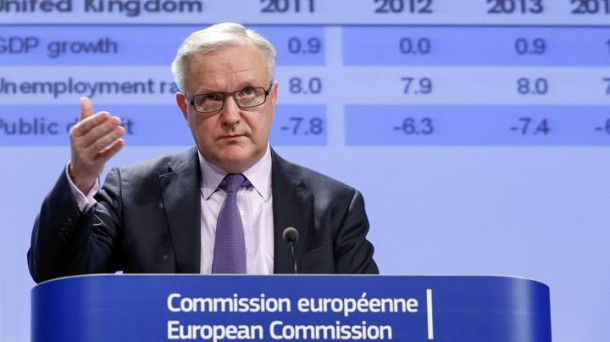Business
European Commission
Spain misses EU goals but may get more time
Reuters
Brussels
The EU's statistics office Eurostat said on Monday that Spain posted a deficit of 7.1 percent of economic output, higher than its 6.3 percent target, the largest shortfall in the EU.
-

EU's top economics official Olli Rehn. Photo: EFE
France and Spain fell short of their budget deficit goals last year and debt levels swelled across the euro zone but the pressure may be easing on Paris and Madrid as the European Commission signals an end to sharp spending cuts.
Outlining the state of Europe's accounts in 2012, the EU's statistics office Eurostat said on Monday that France posted a deficit of 4.8 percent of economic output, higher than its 4.5 percent target. Spain's shortfall was the largest in the EU.
With budget cuts blamed for a second straight year of recession, the EU's top economics official Olli Rehn indicated over the weekend that more flexibility on tough economic targets was needed. His boss, European Commission President Jose Manuel Barroso, said on Monday that austerity had reached its natural limits of popular support.
"While I think this policy is fundamentally right, I think it has reached its limits," he told a conference. "A policy to be successful not only has to be properly designed, it has to have the minimum of political and social support."
Budget cuts have been at the centre of the euro zone's strategy to overcome a three-year public debt crisis but they are also blamed for a damaging cycle where governments cut back, companies lay off staff, Europeans buy less and young people have little hope of finding a job.
Crippling levels of unemployment and outbreaks of violence in southern Europe are now forcing a rethink, with the focus shifting to economic growth strategies.
Despite cuts and tax increases, Spain's budget shortfall was 7.1 percent, excluding bank recapitalisation, higher than the government's 6.98 percent official year-end reading and well above Madrid's original target of 6.3 percent.
Adding in the cost of recapitalising Spain's banks and a 40 billion euro ($52 billion) bank bailout from the euro zone, Spain's deficit was nearly 11 percent in 2012, higher than the European Commission's forecast of 10.2 percent, and an increase from the 9.4 percent deficit of 2011.
That was higher than Greece, and the highest in the EU. The euro zone's combined sovereign debt burden also hit a record of 90.6 percent of GDP in 2012, Eurostat said.
End of austerity?
The shift in austerity policies is backed by an improving picture overall, however. The 17-nation euro zone's combined fiscal deficit was 3.7 percent of gross domestic product, compared with 4.2 percent in 2011 and 6.5 percent in 2010.
Partly as a result, both Spain and France are expected to get more time to reach EU-mandated targets of 3 percent. "We need to combine the indispensable correction in public finances, huge deficits, huge public debt ... with proper measures for growth," Barroso said in a speech in Brussels just before Eurostat released its data.
EU leaders are desperate for economic growth, and the Commission will decide on May 29 whether to recommend to EU finance ministers to give Paris and Madrid until 2015 to cut their fiscal gap to 3 percent of GDP, today targeted for 2014. It is not yet clear just how big a policy shift EU policymakers are planning.
Rehn, the EU's economic and monetary affairs commissioner, told Reuters in Washington on Thursday that financial leaders from the group of 20 economies calling for less austerity were "preaching to the converted."
Rehn is looking increasingly at countries' fiscal efforts in structural terms, which means removing the effects of the business cycle and one-off measures on the budget. But Germany and the European Central Bank want to see the euro zone put its finances in order after a decade of borrowing when countries' debt and deficit levels rose dramatically.
In addition, the EU's Fiscal Compact treaty signed by all EU countries, except Britain and the Czech Republic, in March 2012 requires governments to keep the budget in balance or surplus with a structural deficit no higher than 0.5 pct of GDP.
"I can't see there's been a big change and that austerity is off the table," said Jurgen Michels, an economist at Citigroup. "Most countries will have to come out with additional, substantial fiscal measures in order to meet their new targets."
top stories



-
news
New anti-eviction law
Andalucia begins proceedings to seize confiscated houses from banks
-
news
London attack
British police ponder conspiracy after soldier murder
-
Sport
Giro d'Italia
Nibali tightens grip on overall lead after stage victory
-
Sport
Spanish soccer league
Real Sociedad, Valencia resume duel for last Champions League ticket
-
Sport
Giro d'Italia
Nibali tightens grip on overall lead after stage victory
© EITB - 2024 - Privacy Policy - Legal disclaimer - Cookie Policy - Cookie settings


